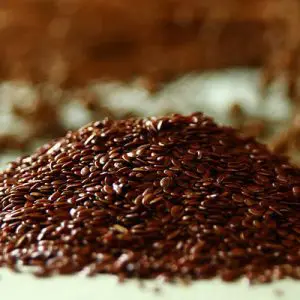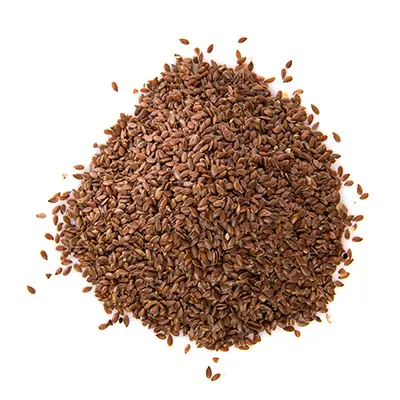Flax seed has been in use for a very long time. Evidence of human use has been dated to the Upper Paleolithic period, some 30,000 years ago in what is present day Republic of Georgia. 9,000 years ago oilseed flax was domesticated in Syria. Flax then made it to Switzerland, Germany, China and India about 5,000 years ago. In ancient Egypt, temple walls were decorated with paintings of flowering flax, priests wore flax linen vestments, and the dead were wrapped in flax linen.
After a period of decline with the fall of Rome, Charlemagne put forth laws that instituted the use of flax once again because of the considered hygiene of linen fabrics and the health benefits of flaxseed oil. By the Middle Ages, Flanders was the center of the linen industry and centuries later, flax arrived in the New World with the colonists, where it was a mainstay in textile production until it was finally overtaken by cheaper cotton in the early 20th century.
All down the ages, flax proved itself to be extremely useful for the production of textiles, ropes, oil and seeds for human consumption, as well as feed for livestock. Its given name, Linum usitatissimum, literally means ‘very useful’!
Today, we have become far more aware of flax’s value nutritionally. It is rich in ALA (omega-3 fatty acid), fiber and contains as much as 800 times more lignans than other plant foods. Lignans are chemical compounds in plant-based foods that when digested, are activated by intestinal bacteria. It is theorized that they may have anti-inflammatory properties and possibly reduce the risk of heart disease. Research has shown that flax lignans may reduce growth of cancerous tumors, particularly those that are hormone-sensitive (i.e. breast, endometrial, and prostate).

Flax seeds are easily added into our daily diet routines. Add a couple of tablespoons to a smoothie! Bake them into your muffins and breads! Include them in your granola! Sprinkle on them on your salads! They can even be used as an egg substitute in vegan recipes, by mixing them with water. Flaxseed oil can be taken as a supplement, in liquid form or in soft-gel capsules. Hens fed whole ground flaxseed produce ‘omega eggs’ which are high in omega-3. You can even find them in commercially prepared snacks. And of course the internet is full of sites where you can find easy recipes to help you get started on adding this amazing seed to your diet.
More Information
Sources:
Health Benefits of Lignans
https://www.livestrong.com/article/116837-lignans-benefits/
Top 10 Benefits of Flaxseed + How to Add Flaxseeds to Your Diet
https://draxe.com/10-flax-seed-benefits-nutrition-facts/
Flax and flaxseed oil: an ancient medicine & modern functional food
US National Library of Medicine, National Institutes of Health
https://www.ncbi.nlm.nih.gov/pmc/articles/PMC4152533/
Flax
North Dakota State University
https://www.ag.ndsu.edu/lem/flax/history-and-uses-1
The Health Benefits of Flaxseed Oil
https://www.globalhealingcenter.com/natural-health/
the-health-benefits-of-flaxseed-oil/?gclid=EAIaIQobChMIj8T30s2q2QIVjbbACh3UPgMtEAAYASAAEgLL-_D_BwE
9 Fantastic Benefits of Flaxseed
https://behealthy.today/9-fantastic-benefits
-flaxseed/


